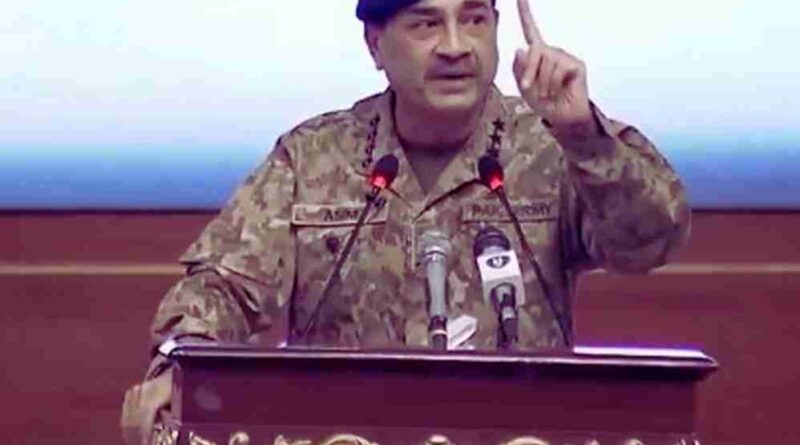Tensions Flare Again as Pakistan’s Army Chief Revives Kashmir Rhetoric Amid India Border Stability
In yet another sharp turn of rhetoric, Pakistan’s Army Chief General Asim Munir has reignited hostilities by issuing fresh threats toward India while once again spotlighting the long-standing Kashmir dispute. His recent statement, which many experts describe as a politically charged provocation, comes at a time when India has been focused on regional stability and economic growth.
Speaking at a high-profile event in Pakistan, General Munir claimed that Pakistan would respond decisively to any perceived aggression from India. He further reiterated Pakistan’s unwavering stance on Kashmir, referring to it as the “unfinished agenda of partition.” His remarks have been widely interpreted as a signal to hardliners at home, as well as a challenge to New Delhi’s firm stance on territorial sovereignty.
A Familiar Strategy
Observers of South Asian geopolitics note that such statements from the Pakistani military establishment often surface during periods of internal political or economic turmoil in Pakistan. With the country grappling with a deteriorating economy, political instability, and international pressure on various fronts, the military seems to be reverting to its old playbook—using Kashmir as a rallying cry to unify internal sentiment.
General Munir’s tone is being seen by many analysts as an attempt to reassert the military’s dominance in national discourse. In Pakistan, the army has long been the most powerful institution, often overshadowing civilian leadership. When facing internal scrutiny or unrest, such posturing toward India frequently becomes a diversionary tactic.
India’s Measured Silence
New Delhi, in contrast, has not reacted officially to Munir’s comments, choosing instead to maintain a tone of calm restraint. Indian officials have consistently emphasized that Jammu and Kashmir is an integral part of India and that the region’s status is not open to negotiation. Since the abrogation of Article 370 in 2019, India has made it clear that it considers the Kashmir issue closed from a constitutional standpoint.
Despite repeated provocations, India has focused on strengthening its border security infrastructure and investing in economic and technological development in Jammu and Kashmir. The approach has been more about consolidating control and less about entering into a rhetorical or military escalation.
Global Reactions and Implications
While global powers have not directly commented on General Munir’s latest remarks, diplomatic circles are watching the situation closely. Any escalation between two nuclear-armed neighbors like India and Pakistan always raises international concerns. However, there is also a growing perception globally that Pakistan’s repeated references to Kashmir, especially through military voices rather than diplomatic channels, are beginning to lose traction.
India’s strategic partnerships with the West, including the United States and several European nations, have only grown stronger over the past decade. Meanwhile, Pakistan has found itself more reliant on China and Middle Eastern allies, often facing scrutiny over human rights and democratic backsliding.
The Human Cost of Rhetoric
For many civilians on both sides of the border, these repeated flare-ups in rhetoric bring back memories of past violence and conflict. Communities in the Kashmir region, in particular, continue to live under the shadow of uncertainty. While the political and military elites engage in high-stakes statements, it is the ordinary people who bear the brunt of tension.
In India-administered Kashmir, normalcy has been returning slowly, with tourism and infrastructure seeing some signs of revival. However, whenever such aggressive statements emerge from across the border, local anxiety increases, affecting daily life and community morale.
A Call for Responsibility
In a world increasingly facing common global challenges—climate change, economic uncertainty, and public health—experts suggest that leaders in South Asia need to move away from aggressive posturing and focus on cooperation and stability.
General Munir’s threats may resonate in certain domestic circles, but on the international stage, such comments do little to enhance Pakistan’s diplomatic standing. For regional peace, it is essential that dialogue replaces threats, and development takes precedence over division.
As of now, India continues to monitor the situation closely, prepared to defend its interests, but evidently more inclined to focus on peace, progress, and resilience. The world is watching, and the hope remains that wisdom will prevail over warmongering.
Disclaimer
The information and content shared on digitalgithub.com — including articles, blogs, news, guides, and other resources — is intended for general informational and educational purposes only. We do not guarantee the completeness, reliability, or suitability of any information. Always seek the guidance of a qualified professional before making decisions based on the information you read. Use this site at your own risk.

